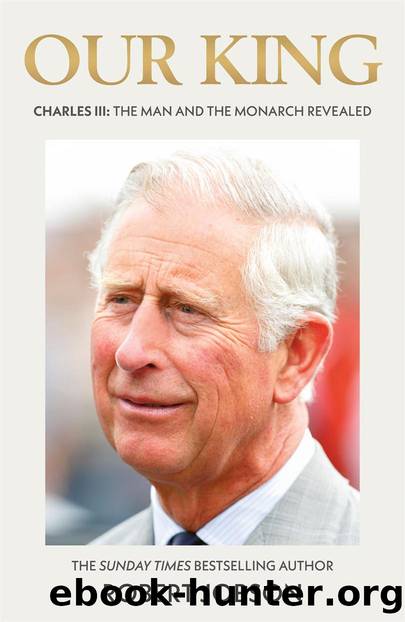Our King by Robert Jobson

Author:Robert Jobson
Language: eng
Format: epub
Publisher: John Blake
CHAPTER 12
Dissident at Heart
He [Prince Charles] would readily embrace the political aspects of any contentious issue he was interested in . . .
He often referred to himself as a dissident working against the prevailing political consensus.
MARK BOLLAND, DEPUTY PRIVATE SECRETARY TO THE PRINCE OF WALES 1997â2002
A British monarchâs residual powers â the so-called royal prerogative â are mostly exercised through the government of the day. These include the power to enact legislation, to award honours on the advice of the prime minister, to sign treaties and, crucially, to declare war. But would King Charles, given his deeply held convictions, simply have rubber-stamped a decision to invade Iraq on prime minister Tony Blairâs say-so, as the late Queen Elizabeth did?
Indeed, would Sir Tony, as he is now,1 have been so hawkish if his king and commander-in-chief of the British armed forces had kicked back and insisted that Blair disclose and discuss the so-called irrefutable intelligence that Iraqâs dictator Saddam Hussein had weapons of mass destruction? After all, it is a British prime ministerâs constitutional responsibility to tell the monarch what is happening and the monarchâs constitutional duty to probe and to ask questions about what they are being told.
It is supposition, of course, as we do not know what stance the late Queen took with Blair, and what he told her. Like Her late Majesty, ultimately King Charles would have had to acquiesce eventually to remain politically neutral, as he must. That said, given his deep knowledge and extensive and high-level contacts in the Gulf states, and the esteem in which he is held in in the Arab world, it is hard to imagine Charles would have remained silent, and that Blair would have had an easy ride.
Charles was not alone in his grave reservations about sending in the troops in what was being called an âillegal warâ, as the offensive did not have United Nations backing. Kofi Annan, the United Nations secretary-general, stated clearly in September 2004 that he believed the US-led, UK-backed invasion of Iraq was an illegal act that contravened the UN Charter, and any decision should have been made by the Security Council, not unilaterally. Blairâs government responded by saying the attorney general made the âlegal basis . . . clear at the timeâ.2
Sources close to Charles, however, believe that while as monarch he would have had no choice but to allow Blair to pursue his agenda, he would undoubtedly have voiced âhis strongest possible objectionsâ on the war. âHe most certainly would have advised the prime minister to think again and warned against British military intervention,â said an informed source. His advice to Blair, senior sources confirmed, would have been to heed the warnings of experienced Arab leaders in the region, rulers with whom Charles had built up a good rapport and working relationships over many years.
As Prince of Wales, Charlesâs desire to be seen as a pioneer and a shaper of ideas, and to enjoy growing political influence, was a source of serious concern to his advisers.
Download
This site does not store any files on its server. We only index and link to content provided by other sites. Please contact the content providers to delete copyright contents if any and email us, we'll remove relevant links or contents immediately.
| Military | Political |
| Presidents & Heads of State | Religious |
| Rich & Famous | Royalty |
| Social Activists |
Waking Up in Heaven: A True Story of Brokenness, Heaven, and Life Again by McVea Crystal & Tresniowski Alex(37018)
Empire of the Sikhs by Patwant Singh(22185)
We're Going to Need More Wine by Gabrielle Union(18086)
Hans Sturm: A Soldier's Odyssey on the Eastern Front by Gordon Williamson(16786)
Leonardo da Vinci by Walter Isaacson(11919)
The Radium Girls by Kate Moore(10916)
Educated by Tara Westover(7078)
Tools of Titans by Timothy Ferriss(6965)
How to Be a Bawse: A Guide to Conquering Life by Lilly Singh(6701)
The Last Black Unicorn by Tiffany Haddish(5081)
Permanent Record by Edward Snowden(5007)
The Rise and Fall of Senator Joe McCarthy by James Cross Giblin(4852)
Promise Me, Dad by Joe Biden(4456)
The Wind in My Hair by Masih Alinejad(4427)
The Crown by Robert Lacey(4115)
A Higher Loyalty: Truth, Lies, and Leadership by James Comey(4041)
The Iron Duke by The Iron Duke(3650)
Joan of Arc by Mary Gordon(3270)
How to be Champion: My Autobiography by Sarah Millican(3193)
